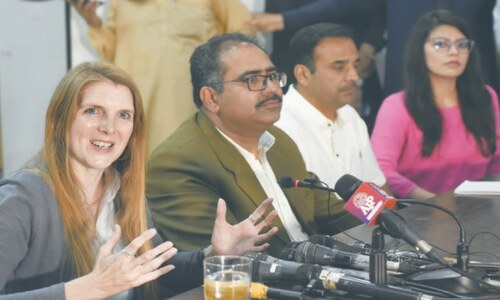MUZAFFARABAD: Azad Jammu and Kashmir (AJK) President Sardar Masood Khan on Monday said the turbulent state of Jammu and Kashmir was in dire need of a lingua franca for peace, alongside the preservation of its linguistic and cultural heritage.
Speaking at the inaugural session of ‘Third Kashmir International Conference on Linguistics’, organised by the University of Azad Jammu and Kashmir (UAJK), he maintained that India’s military and armed adventures could neither break the resolve of Kashmiris nor their commitment to an amiable and peaceful resolution of the dispute through the language of peace, harmony and connectivity.
“India must avoid the language of confrontation, aggression and suppression and must come to the table of dialogue, and the international community should also explore the language of peace to help resolve this issue according to the aspirations of the people of Kashmir,” he said.
Linguistic, cultural heritage of Jammu and Kashmir needs to be preserved, says AJK president
The inaugural session, attended by academics, researchers, scholars, civil society activists and students from Jammu and Kashmir, Pakistan and other countries, was also addressed by UAJK Vice Chancellor Prof Dr Mohammad Kaleem Abbasi and Faculty of Arts Dean Prof Dr Ayesha Sohail.
According to Dr Sohail, the major theme of the two-day biennial interdisciplinary conference was “Linguistic Diversity and Cultural Preservation in South Asia”.
The conference theme, she said, was a well-timed initiative because languages were undergoing drastic changes, particularly the undocumented ones being overshadowed by more prestigious and well-documented ones.
The AJK president expressed the hope that the conference would help understand different languages, their history, phonetics and phonology, morphology, syntax and socio-linguistics. He said the state of Jammu and Kashmir had a rich linguistic landscape dominated by two major families: Indo-European and Sino-Tibetan.
In spite of its rich linguistic diversity, the disputed Himalayan region was treated as one cohesive unit because of its history and geography, he said, and added that the state could not be divided on the basis of language, religion or culture
Stressing the need of determined efforts to ensure the survival of the language facing extension, he said the end of a language was the end of a culture and civilisation.
Mr Khan said internet and cyberspace technologies had created space for multilingualism, which was good news for local languages and cultures.
“Above all, we should strive towards finding a language of peace and harmony and not a language of conflict,” he noted.
Published in Dawn, April 17th, 2018














































Dear visitor, the comments section is undergoing an overhaul and will return soon.